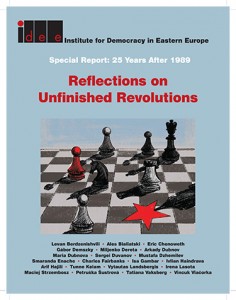IDEE Special Report
25 Years After 1989–91:
Reflections on Unfinished Revolutions
The IDEE Special Report, “25 Years After 1989–91: Reflections on Unfinished Revolutions,” includes the important findings and recommendations regarding the current state of the post-communist region from an Institute for Democracy in Eastern Europe seminar organized in Warsaw, Poland on October 3–5, 2014. An Executive Summary provides the key findings and recommendations of the participants; the Final Report offers brief descriptions of the main themes raised in each session.
The seminar gathered 22 veterans of the 1989–91 Revolutions from Eastern Europe and the nations that gained independence from the former Soviet Union, individuals who continue to play significant roles in their countries’ political and social lives (see Profiles of Participants). The seminar was organized into seven thematic sessions, including “revolution, evolution or devolution,” constitutionalism and electoral choices, development of political parties and oppositions, decommunization and transitional justice, civic institutions and citizens’ participation, and media along with a middle and closing session on “What is the Unfinished Business?” (see Statement of Seminar and Program). For each session, a participant presented a paper with a country case study on the topic, following which there were one or two participant responses and dialogue among all the participants.
The full proceedings are being published as a special issue of Uncaptive Minds. The individual seminar papers are also available in digital format here.
Selected Seminar Questions
• In countries where elections became generally free, fair, and normal, why have the transitions from communism been so incomplete and the role of non-democratic parties so strong?
• Why is civic life and citizens’ participation in the new democracies so weak?
• What happened to the dream of independent media and other basic democratic institutions?
• What was the role of Russia in preventing a broader expansion of liberal democracy in the region and what role did former communist elites play in re-instituting authoritarian models?
• What role did the West play? In what areas was it positive and in which was it negative?
• What were the missed opportunities and what are the prospects today for advancing democratic freedom?
• In the face of a revanchist Russia, what can be done to strengthen the democratic transitions in East Central Europe, Baltic, and Balkan countries and what should be done to further democratic progress in the rest of the “post-Soviet space” so that they are not permanently relegated to dictatorship and Russian domination?
Selected Quotes from the Special Report
Out of their common experience living under and taking part in the overthrow of communist dictatorships, [the participants] shared an abiding commitment to supporting the advancement of Western liberal democracy and universal human rights throughout the region and across all geographic, political, ethnic, national, and religious division lines that have emerged. New waves of democracy can come unannounced. As Estonian independence leader Tunne Kelam noted, “The past 25 years have demonstrated that nothing is impossible. . . . Why is it still so difficult to imagine that other realities will become true?”
• • •
Mustafa Dzhemilev, the dissident hero of the Soviet human rights movement and the recognized national leader of the Crimean Tatars, voiced the most urgent appeal of the seminar: “Do not forget Crimea.” Underlying his appeal is the reasonable fear that Western countries will ultimately recognize Russia’s annexation, which some European leaders have already suggested. For the seminar participants, the annexation of Crimea and the larger invasion of Ukraine are the clearest and gravest dangers to democratization throughout the region. The most recent conflict in Ukraine remains boiling, but the participants warned that Russia’s aggression threatens to freeze for decades the arc of authoritarianism in the post-Soviet space and to compromise, limit, or reverse the course of democracy’s expansion in Eastern Europe.
• • •
In discussion, [Lithuanian independence leader] Vytautas Landsbergis summarized the situation in Russia: “Right now, the minority lives in a society where the majority accepts living in a madhouse.” It becomes an urgent priority, therefore, to support the minority of “normal people” who reject “the madhouse.”
• • •
[P]articipants were highly critical of the West’s lack of a firm response to Russia’s political regression and military aggression. They expressed great frustration at the weakness of the sanctions imposed on Russia and the inconsistency of Western countries in asserting alliance principles, in defending the post-war international order, and in protecting and extending Western values and democratic standards, including in the new and prospective members of NATO and the EU. . . . [But] criticism of Western policies toward the region reflected the participants’ belief in the essential importance of the Western alliances of democratic countries—the EU and NATO—in helping to consolidate and further progress toward liberal democracy in the region and in rebuffing the Russian Federation’s efforts to consolidate and further “anti-democracy.”
• • •
These veteran democratic activists and leaders . . . urged a re-commitment to the broader promise of 1989–91 . . . [and] appealed first and foremost for a restoration and strengthening of the original goals and previous strategies that were so successful in facing the threat of the Soviet Union and helping the people of the region expand the zone of freedom and advance democracy 25 years ago. Uphold principles of international law. Enforce international agreements such as the UN Charter and Universal Declaration of Human Rights. Do not recognize the consequences of imperialism. Defend and advance liberal democratic values and principles.
IDEE Special Report (full)
Introduction
Executive Summary
Final Report
Profiles of Participants
Seminar Program
In Memoriam:
Miljenko Dereta



